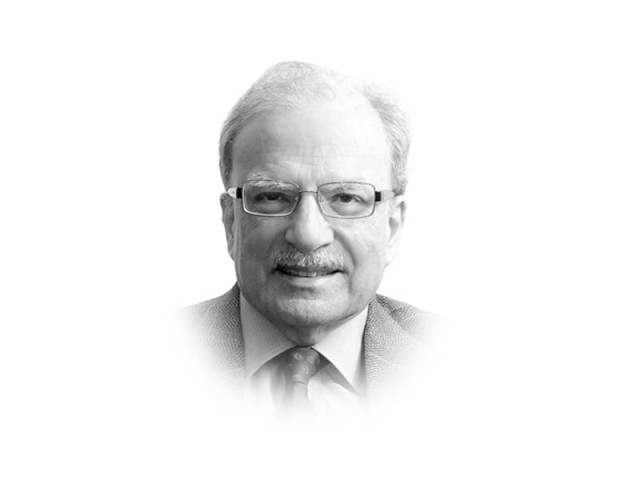Inequality and public policy
Inequality — the perception about it or in reality — has had a profound impact on Pakistan’s political development

This time, regional inequality led to a crisis that was to lead to Pakistan’s break-up in 1971. That such an outcome was possible in a fragile state such as Pakistan should have been seen as the inevitable outcome of policies adopted by the governing elite in the first two post-independence decades. The sidelining of the traditional Pakistani establishment in the country’s western part because of its initial reluctance to accept the separatist politics of Muslim India was coupled with the arrival of eight million Muslim refugees from India to produce a political situation inimical for the people of East Pakistan. The new urban elite that came to Pakistan from what were the Muslim minority provinces in British India formed an informal coalition with the members of the superior civil services to govern Pakistan. The latter had the experience and competence to begin to govern a country that was born without a functioning government. In these tectonic shifts, the fact that Pakistan had come divided into unequal parts escaped the attention of new policymakers.
More people resided in Pakistan’s eastern wing than in politically dominant western part. The east also raised more foreign exchange than the West. The jute produced there, called the golden fibre, was in high demand in world markets particularly during the Korean War in the early 1950s. But the focus of public policy was on the West. Resettlement of the refugees from India, building a new capital in Karachi, industrialising a country that had an almost entirely agricultural economy, and creating an economy that was less dependent on that of India kept the policymakers fully occupied in Karachi. Very little attention was paid the eastern wing.
Stirring of resentment in the East because of this unequal treatment was dealt with superficially by the appointment of three Bengali leaders to the office of prime minister, Khawaja Nazimuddin, H.S Suhrawardy, and Muhammad Ali Bogra. That did not pacify the people in the eastern wing since the prime ministers had the position but not the power. The power was with the powerful civil bureaucracy, later joined by the senior officers from the military.
Adding insult to the injury already inflicted on East Pakistan was the approach adopted by Field Marshal Ayub Khan, Pakistan’s first military president. East Pakistan, which then had a larger population than the West, was forced to accept the formula of ‘parity’ which was the basis of the Constitution of 1962. In the National Assembly created by the Constitution, the two provinces were given an equal number of seats. General Yahya Khan, Ayub Khan’s successor, dispensed with parity as the basis of the political order. His Legal Framework Order under which he governed gave 162 of the 300 seats in the yet-to-be-formed National Assembly. The remaining 138 went to the four Western provinces. The Awami League headed by Sheikh Mujibur Rahman won 160 of East Pakistan’s 162 seats in the elections held in December 1970. The people’s verdict was clear and there was no room for negotiations. But that was precisely what the military, egged on by Zulfikar Ali Bhutto, proceeded to do. Bhutto’s Pakistan Peoples Party had won only 81 seats, none from East Pakistan. Instead of allowing the Awami League to form a government at the center, Yahya Khan ordered military action against the party as Bhutto flew back from Dhaka following the breakdown of negotiations in East Pakistan’s capital. Upon landing in Karachi he declared that the military had saved Pakistan. In fact Pakistan was destroyed in the form in which it had been created by its founder Muhammad Ali Jinnah.
I was witness to the spectacle of how much East Pakistan had been excluded from policymaking when a meeting was held in Dhaka’s Governor House to discuss the apportioning of public funds under the Fourth Five Year Pakistan (1970-75). As the economic adviser to West Pakistan’s Governor Air Marshal Nur Khan, I participated in the Dhaka meeting chaired by Yahya Khan. The federal government’s position was presented by M M Ahmad, Planning Commission’s deputy chairman, that of West Pakistan by Nur Khan and that of East Pakistan by the province’s governor Admiral S M Ahsen. All the major players at the table were from West Pakistan. Looking around the conference table, I was stuck at the absence of the Bengalis. It was not a surprise, at least to me, when the exclusiveness on the basis of which West Pakistan had built the political and economic structures in the country’s led to its break-up. There are lessons in this for present-day Pakistan.
Published in The Express Tribune, November 17th, 2014.
Like Opinion & Editorial on Facebook, follow @ETOpEd on Twitter to receive all updates on all our daily pieces.















COMMENTS
Comments are moderated and generally will be posted if they are on-topic and not abusive.
For more information, please see our Comments FAQ